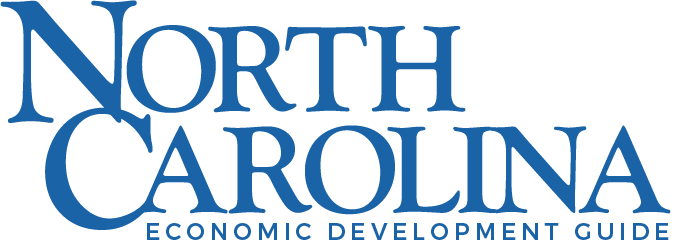Economic Development Q&A: ROY COOPER
COOPERATOR IN CHIEF
N.C. Gov. Roy Cooper is concluding his second term as North Carolina’s 75th governor, with term limits precluding another run.
Cooper has championed economic development during his tenure, participating in key decisions that have helped attract the largest new-project investments in state history. It has been a challenging political environment for the Democratic governor because Republicans dominate the N.C. General Assembly. The GOP has held veto-proof supermajorities in the legislature during part of his two terms.
A signature of Cooper’s governorship includes negotiating and signing energy legislation that requires N.C. utilities to reduce power-generation carbon emissions 70% by 2030 and achieve carbon neutrality by 2050.
The governor grew up in Nash County, where his father was a farmer and attorney, and his mother taught school. Cooper spent summers working on the family’s farm and received his undergraduate and law degrees from UNC Chapel Hill. He practiced law, served in the General Assembly and was N.C. Attorney General for four terms before winning the governor’s election in 2016. He and his wife, Kristin, have three grown daughters.
He talked with Katherine Snow Smith about the state’s economic development success and how challenges are addressed.
What are key factors that have enabled N.C. to land multibillion dollar investments including Toyota, Vinfast, Eli Lilly and Wolfspeed and Boom? What is needed to keep this momentum going?
A few months ago, coach Roy Williams and coach Mike Kryzewski jointly announced (via remote shoots on CNBC) that for the second year in a row, North Carolina had won the best state for business in the country. Those two coaches are successful because they generally have the best players. North Carolina is successful because we have the best workforce. The credit for this goes to the people of our state. They are the best trained, educated, diverse workforce in the country and companies know that. I think the reason for our success is because for decades, North Carolina has invested in our people. We have the best community college system in the country. We have the greatest array of private and public universities in the country. In talking to CEO after CEO, the most important issue they are facing right now is workforce and right behind that is infrastructure, and we have been able to supply both. Also our collaboration among local state and federal officials has been extraordinary. We’ve been targeting several areas that have seen significant success. Clean energy is one. Getting ahead of that curve that is coming, the private market is moving to clean energy and we want to be at the front end of that wave and I think we’ve done that. We’ve also centered on biotechnology, life sciences, aerospace and advanced manufacturing. We have the largest manufacturing workforce in the Southeast. Because of the education institutions that we have, they are highly skilled and adaptable.
We are known for a highly trained and diverse workforce, but there’s still a labor shortage nationwide as well as in our state. How is this being addressed? How do you convince new and existing companies that the state can address their workforce needs?
A lot of people ask me what keeps me up at night. This is one of those things. We are attracting jobs at such a fast pace that I want to make sure we have enough skilled workforce to meet our growing needs. We’re the third-fastest growing state. Matching those North Carolinians to great jobs, whether it’s manufacturing or tourism or anywhere else, is the job of people who are working in our Department of Commerce through workforce solutions and workforce development and our community colleges.
We have a First in Talent plan in our Department of Commerce that lays out how we can continue to be a successful place for companies to find these great workers and match them with fantastic jobs. We have made workforce training a priority pairing industry with the community colleges and making sure we are flexible because the nature of these jobs is changing so fast. People who have been doing something for a long time are having to get new skills to be able to take new jobs. It is very different. We prize our diversity in our workforce. We are fortunate to have the highest concentration of four-year Historically Black Colleges and Universities of any state in the country. North Carolina
A & T State University graduates more Black engineers than any other school in the nation. We’ve expanded our opportunities for more debt-free community college with more Longleaf Commitment Grants that I’ve proposed to the legislature that they’ve taken us up on. I think CEOs know when they come to North Carolina they will be able to find A-class employees.
North Carolina is continually praised for collaboration between local and state governments to give incentives to businesses as well as create training programs and piece together crucial infrastructure upgrades. Why is North Carolina better positioned to collaborate than other states?
It’s well publicized about the differences I have had with the Republican legislature. Those differences get most of the attention. But the real story is how we have worked together in a bipartisan way. This legislature has given me and my administration broad authority on performance-based incentives and recruiting strategy that they did not trust with my predecessor. They have recognized the governor is the chief economic recruiter, and we’ve worked together on economic development pretty smoothly.
We have had across the board agreement on our strategy. We keep (legislators) clued in to the work we are doing to attract companies. Sometimes we all sit at the table together with the governor and Republican and Democratic legislators and that’s powerful when CEOs see that cooperation. I believe our economic recruiters and local officials are extraordinary and they have appreciated the collaboration of the state leaders. On top of that we have excellent partnership with organizations like the Golden Leaf Foundation, which regularly support our infrastructure needs. You couple that with the generational investments we’ve been making and with all of the legislation that the Biden-Harris administration has been able to get passed for infrastructure, water, waste water, childcare, roads, bridges, ports, high-speed internet access. Also, all of the incentives to move into the clean energy arena where we already were, that’s pretty extraordinary. CEOs here recruit for us. They know we don’t disappear when the ribbon is cut. They see us continue to collaborate with them as their business grows and that reputation is important. We convinced Honeywell to move its corporate headquarters to Charlotte, and their CEO has been an evangelist of sorts for North Carolina for lack of a better word. Companies will talk with other companies.
We know there’s a dire shortage of workforce housing across the country and North Carolina as well. What can be done to address this problem in an urgent manner?
It’s one of the most challenging issues we face in North Carolina, and we have not made as much progress on this as I would like. But we know this is something across the country that people are facing. Success causes high housing prices. We need places for people to live so that they can work. High-speed internet access is going to help with this because we are having more and more remote work. People are living in our more rural areas, they can go to our urban centers maybe twice a week, and they can afford to live a little farther away. The local governments are working hard with the federal government. But in North Carolina there is not a separate housing department. We really have not played a large role on the state level for housing. I’ve wanted to up that game for our state. My current budget proposal provides for significant funding to N.C. Housing Trust Fund (funds leverage private funding to create a variety of housing solutions) and the Workforce Housing Loan Program.
I don’t know what the General Assembly is going to do. They have not been that interested in investing state money in housing. I think that is something we need to do better. The legislature needs to understand that those investments are important to economic development because the workforce needs places to live. Cities in particular are seeing this acutely right now because you need places for teachers, police officers and tourism workers and it makes it harder and harder for them to be able to come in and do their jobs. This is something I think we have to pay more attention to.
Advocating for higher public school teacher pay has been a hallmark of your tenure as governor. How important is improving North Carolina’s K-12 system in terms of economic development and making the state attractive to existing and incoming businesses?
I think it’s not just K-12. It’s cradle to career. We must make investments from early childhood quality child care all the way through to our community colleges and universities and even adult training. I hear from CEOs: “Your taxes are low enough. That’s not the problem. What we need is a diverse, highly skilled workforce.”
It’s one of the reasons why businesses are now lobbying the legislature for more support for early childhood education and quality childcare. Those investments I call the “triple play.” One, you get early childhood education for the child to make them more successful in school and in life. Two, it allows the parent to go to work, and three, it allows the business to hire that parent. But, investments through K-12 are critical. We have 5,000 teacher vacancies right now. We don’t have enough bus drivers. We need to make significant investments to keep our teachers. I am deeply concerned that over the last few years that this negligence in not investing enough in our public schools can hurt us in the long run. I’ve had a number of bipartisan discussions with people, and one thing across the board that we can agree on is that public education can be great if we simply have a great teacher in every classroom and a great principal in every school. That means you have to recruit them to keep them and pay them and respect them. Right now I’m deeply concerned about our public schools particularly with the billions of dollars (Republicans) want to go into private school vouchers, which will hurt public schools and will not improve education. So, we’ve got a lot of work to do in that arena if we want to continue to be the No. 1 state for business out into the future because we have benefited from investments that have been made in N.C. education for decades, and we have to keep that up.

